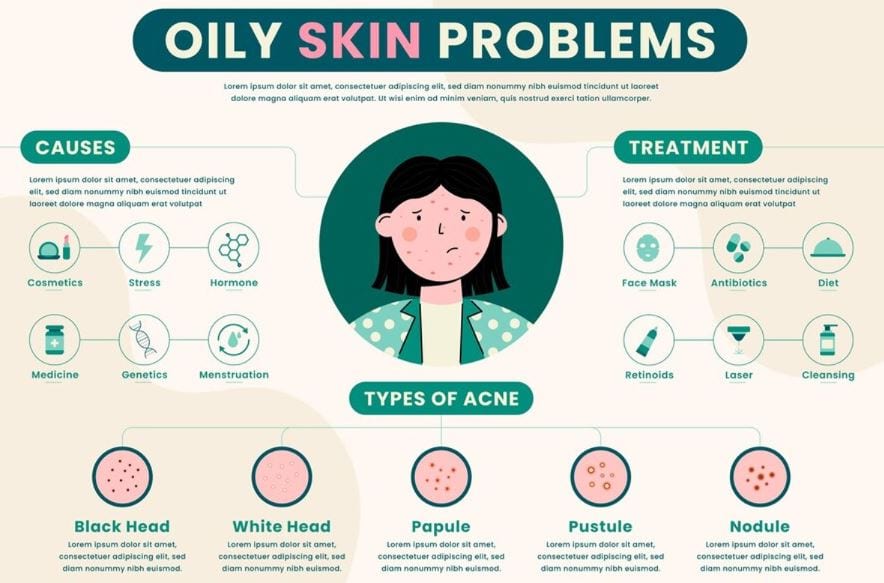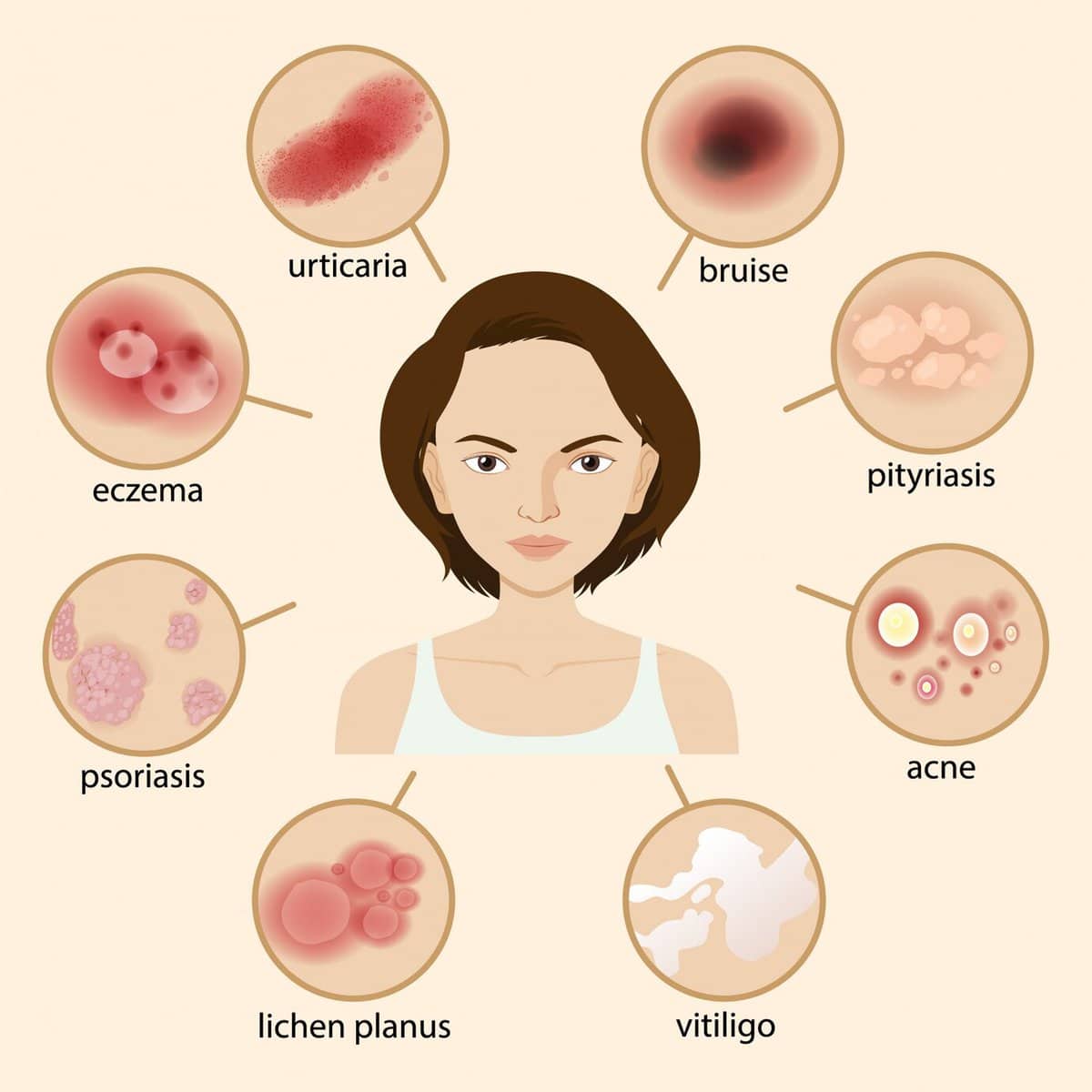
Tips for Healthy Skin: A Guide to Disease-Free Skin
Did you know that your skin is the largest organ of your body?
It covers an average of about 20 square feet and plays a vital role in protecting your internal organs, regulating body temperature, and acting as a barrier against harmful environmental factors.
Taking care of your skin is crucial for maintaining a healthy and disease-free complexion, and it starts with incorporating the right habits into your skincare routine.
Key Takeaways:
- Protect your skin from the sun by using sunscreen and wearing protective clothing.
- Quit smoking to improve the health and appearance of your skin.
- Treat your skin gently by using gentle cleansers and moisturizers.
- Follow a healthy diet rich in fruits, vegetables, and lean proteins to nourish your skin.
- Manage your stress levels to promote healthy skin.
Protect Yourself from the Sun
Sun protection is crucial for maintaining healthy skin.
With proper sun protection measures, you can minimize the risk of sunburn, premature aging, and skin damage. Here are some key ways to protect yourself from the harmful effects of the sun:
- Use a broad-spectrum sunscreen: Choose a sunscreen with an SPF of at least 15 or higher to shield your skin from both UVA and UVB rays. Apply it generously to all exposed skin at least 15 minutes before going outside.
- Seek shade: During the peak sun hours, typically between 10 am and 4 pm, try to stay in the shade as much as possible. This will reduce your direct exposure to intense sunlight.
- Wear sun-safe clothing: Covering up with long-sleeved shirts, pants, and wide-brimmed hats provides an extra layer of protection against harmful UV rays. Opt for lightweight, breathable fabrics that offer UPF (Ultraviolet Protection Factor) to shield you from the sun’s rays.
- Reapply sunscreen: Sunscreen wears off over time, especially when sweating or swimming. Make sure to reapply sunscreen every two hours or more frequently if you are engaging in water activities.
- Use sun-protective clothing or laundry additives: Consider incorporating sun-protective clothing into your wardrobe, such as shirts and leggings with built-in UPF. You can also boost the UV protection of your regular clothing by using laundry additives designed to enhance their sun-blocking capabilities.
By taking these sun protection measures, you can enjoy the outdoors while keeping your skin safe from the harmful effects of the sun.
Quit Smoking for Healthier Skin
Smoking can have a detrimental effect on your skin’s health and appearance. It is not only harmful to your overall health, but it can also significantly impact the condition of your skin.
One of the most noticeable effects of smoking on the skin is the development of wrinkles.
Smoking accelerates the aging process, leading to premature signs of aging such as fine lines, deep wrinkles, and sagging skin.
This is due to the harmful chemicals in cigarettes, which damage the collagen and elastin fibers that keep the skin firm and supple.
Collagen, a protein responsible for skin’s elasticity, is crucial for maintaining a youthful complexion.
Smoking causes collagen damage, resulting in reduced skin elasticity and the formation of wrinkles.
Quitting smoking is the best way to protect your skin and improve its overall health. When you quit smoking, your skin begins to repair itself.
It starts producing more collagen, which helps to restore its natural elasticity and reduces the appearance of wrinkles over time.
Quitting smoking can also improve blood circulation, allowing more oxygen and nutrients to reach the skin, resulting in a healthier complexion.
Seeking help from your doctor or a smoking cessation program can provide you with the necessary support to quit smoking successfully.
They can provide you with guidance, resources, and strategies to overcome nicotine addiction and prevent further damage to your skin.
Remember that quitting smoking not only benefits your skin but also has numerous other health benefits.
It is a positive step towards improving your overall well-being and reducing the risks of various diseases.
Treat Your Skin Gently
When it comes to maintaining the health of your skin, treating it gently is key.
By adopting certain habits, you can ensure that your skin stays healthy and radiant.
Here are some essential tips for gentle skincare:
Limited Bath Time
While indulging in a long, hot bath can be relaxing, extended exposure to water can strip your skin of its natural oils, leading to dryness and irritation.
It is recommended to limit your bath time to 10-15 minutes and use warm, not hot, water.
Avoid Strong Soaps
Harsh soaps and cleansers can disrupt the natural balance of your skin and strip it of its moisture.
Opt for gentle cleansers specifically formulated for your skin type, and avoid products with harsh chemicals or fragrances.
Shaving Tips
If you shave regularly, it’s important to do so with care to prevent skin irritation and cuts. Here are some shaving tips to keep in mind:
- Ensure your razor is clean and sharp to achieve a close and smooth shave.
- Use a shaving cream or gel to lubricate the skin and protect it from razor burns and cuts.
- Shave in the direction of hair growth to minimize irritation. Avoid pressing too hard, as it can cause razor burns.
- After shaving, rinse with cool water to soothe the skin, and pat it dry gently with a clean towel.
Moisturize Your Skin
Moisturizing is essential for maintaining the natural moisture barrier of your skin and preventing dryness.
Choose a moisturizer that suits your skin type and apply it after cleansing or shaving.
Massage the moisturizer into your skin using gentle upward strokes.
Remember, moisturizers work best when applied to slightly damp skin, as they help lock in moisture.
Make sure to include this step in your daily skincare routine for optimum results.
Treating your skin gently is the foundation of a healthy skincare routine.
By following these tips for gentle cleansing, moisturizing, and shaving, you can maintain the health and vitality of your skin.
Follow a Healthy Diet
Your diet plays a significant role in the health of your skin.
Consuming plenty of fruits, vegetables, whole grains, and lean proteins can provide your skin with essential nutrients and antioxidants, promoting skin health and a youthful appearance.
Fruits and vegetables are particularly beneficial for your skin as they are packed with vitamins, minerals, and antioxidants that can help protect against damage from environmental factors and promote collagen production.
Here is a list of fruits and vegetables that are especially beneficial for your skin:
- Blueberries: Rich in antioxidants that can help fight skin damage and promote a youthful glow.
- Spinach: Contains vitamins and minerals that help nourish the skin and improve elasticity.
- Carrots: High in beta-carotene, which is converted to vitamin A in the body and helps promote healthy skin.
- Avocado: Packed with healthy fats that moisturize the skin and promote a smooth complexion.
- Tomatoes: Rich in lycopene, an antioxidant that helps protect the skin against sun damage.
- Sweet potatoes: Contains beta-carotene and vitamin C, which can help promote collagen production and reduce the signs of aging.
In addition to fruits and vegetables, including whole grains and lean proteins in your diet can further support healthy skin.
Whole grains are a great source of fiber and antioxidants, which can help reduce skin inflammation.
Lean proteins, such as chicken, fish, and tofu, provide essential amino acids that are the building blocks for collagen and elastin, keeping your skin firm and supple.
It’s important to note that staying hydrated is also crucial for maintaining healthy skin.
Drinking plenty of water throughout the day helps flush out toxins from your body and keeps your skin hydrated and glowing.
Skin-Friendly Fruits and Vegetables
Fruit/Vegetable |
Benefit for Skin |
|---|---|
| Blueberries | Packed with antioxidants that protect against skin damage |
| Spinach | Rich in vitamins and minerals that nourish the skin and improve elasticity |
| Carrots | Contains beta-carotene, which promotes healthy skin |
| Avocado | Provides healthy fats for moisturized and smooth skin |
| Tomatoes | Rich in lycopene, which protects against sun damage |
| Sweet potatoes | Contains beta-carotene and vitamin C for collagen production and anti-aging effects |
Including these skin-friendly fruits, vegetables, whole grains, and lean proteins in your diet can have a positive impact on your skin’s health and overall appearance.
Manage Your Stress Levels
Uncontrolled stress can have a negative impact on your skin, leading to increased sensitivity, acne breakouts, and other skin problems.
Stress affects both your physical and mental well-being, and your skin is no exception.
It’s important to prioritize stress management for the sake of your skin’s health and overall well-being.
One effective way to manage stress is by prioritizing sleep. Adequate sleep is crucial for rejuvenating your body and mind.
It allows your skin to repair and regenerate, ultimately promoting a healthier complexion. Aim for 7-9 hours of quality sleep every night to give your skin the rest it needs.
Setting reasonable limits is another essential aspect of stress management.
Learn to recognize your own boundaries and avoid overcommitting yourself.
Take time for yourself, engage in activities you enjoy, and practice self-care.
This will not only improve your mental state but also have a positive impact on your skin’s health.
The Link Between Sleep and Skin
Your skin goes through a process of repair and renewal while you sleep. Lack of sleep can disrupt this process, leading to dullness, dryness, and fine lines.
Sleep deprivation also raises cortisol levels, a stress hormone that can trigger inflammation and exacerbate existing skin conditions such as acne, eczema, and psoriasis.
Prioritizing sleep can lead to a healthier, more vibrant complexion.
“Getting enough sleep is crucial for maintaining a healthy mind and body. It’s the time when our skin can restore and regenerate, leading to a more youthful appearance.” – Dr. Emma Johnson, Dermatologist
Stress-Relieving Activities
Engaging in stress-relieving activities can significantly impact your skin’s health.
Find activities that help you relax and unwind, such as practicing yoga, meditation, or deep breathing exercises.
These techniques can help reduce stress levels and promote a clearer, more radiant complexion.
- Yoga: Practicing yoga can help release tension in the body and calm the mind. Certain poses, such as child’s pose or the corpse pose, promote relaxation and relieve stress.
- Meditation: Spending a few minutes each day meditating can help calm the mind and reduce stress. Find a quiet space, close your eyes, and focus on your breath to achieve a state of tranquility.
- Deep Breathing: Deep breathing exercises, such as diaphragmatic breathing, can activate the body’s relaxation response. Take slow, deep breaths, filling your abdomen with air, and exhale slowly to alleviate stress.
By incorporating stress management techniques and prioritizing sleep, you can improve your overall well-being and promote healthy, glowing skin.
Remember, taking care of your mental health is just as important as taking care of your physical health when it comes to achieving a clear and vibrant complexion.
The Role of Skin Microbiome
The skin’s microbiome, which consists of bacteria and other microscopic organisms, plays a crucial role in maintaining healthy skin.
While some microbes can be beneficial and support the body’s immune system, certain skin diseases are associated with specific microbes.
Scientists are studying ways to promote healthy skin microbes while reducing harmful ones to improve overall skin health.
Benefits of the Skin Microbiome
The skin microbiome is populated by a diverse range of bacteria, fungi, and viruses. These microorganisms interact with the skin cells and each other, forming a complex ecosystem. Healthy bacteria in the skin microbiome can:
- Promote a balanced pH level, which helps maintain skin health.
- Enhance the skin’s barrier function, protecting against environmental stressors.
- Regulate inflammation and immune responses, reducing the risk of skin conditions.
- Produce antimicrobial substances, inhibiting the growth of harmful pathogens.
Imbalance and Skin Diseases
An imbalance in the skin microbiome, known as dysbiosis, can lead to various skin diseases and conditions. Some examples include:
- Acne: Certain strains of bacteria, such as Propionibacterium acnes, can contribute to acne formation.
- Atopic Dermatitis: Imbalances in the skin microbiome have been linked to eczema flare-ups.
- Rosacea: Changes in the skin microbiome may play a role in the development of this chronic inflammatory condition.
Promoting a Healthy Skin Microbiome
There are several ways to support and promote a healthy skin microbiome:
- Use gentle cleansers and avoid harsh antibacterial soaps that can disrupt the natural balance of the skin.
- Avoid over-cleansing or over-exfoliating the skin, as it can strip away beneficial bacteria.
- Moisturize regularly to maintain the skin’s barrier function and promote a healthy environment for beneficial bacteria.
- Choose skincare products with prebiotics or probiotics that can help restore and enhance the skin microbiome.
By understanding the role of the skin microbiome and taking steps to support its health, you can improve your overall skin health and maintain a balanced and radiant complexion.
Adjusting Your Skincare Routine for Different Seasons
Adapting your skincare routine to different seasons is essential for maintaining healthy skin.
Each season presents its own challenges and requires specific skincare measures to keep your skin looking and feeling its best.
Winter Care: Combatting Dryness
In winter, dryness is a common issue that can leave your skin feeling tight, rough, and uncomfortable. To combat winter dryness:
- Use moisturizing creams and lotions to provide your skin with the hydration it needs. Look for products that contain hyaluronic acid or ceramides, as these ingredients help to lock in moisture and restore the skin’s natural barrier.
- Consider using a humidifier in your home to add moisture to the air. This can help prevent dryness and keep your skin hydrated.
By incorporating these winter skincare tips into your routine, you can prevent dryness and maintain supple and healthy skin throughout the colder months.
Summer Care: Protecting Against Sun Damage
During summer, protecting your skin from sun damage becomes crucial.
The sun’s harmful UV rays can lead to premature aging, sunburn, and even skin cancer. Here are some important measures to take:
- Wear protective clothing such as wide-brimmed hats, sunglasses, and long-sleeved shirts to shield your skin from direct sunlight.
- Apply sunscreen with a high SPF (Sun Protection Factor) to all exposed areas of your skin, even on cloudy days. Reapply every two hours, especially after swimming or sweating.
- Seek shade during the strongest sun hours, typically between 10 AM and 4 PM when the sun’s rays are most intense.
Protecting your skin from sun damage not only prevents short-term effects like sunburn but also reduces the risk of long-term damage such as wrinkles, age spots, and skin cancer.
“Adapting your skincare routine to the changing seasons is essential for maintaining healthy and radiant skin throughout the year.”
Remember, seasonal skincare is about adjusting your routine to address specific challenges presented by different weather conditions. By following these skincare tips, you can ensure that your skin stays healthy, hydrated, and protected all year round.
Season |
Main Challenge |
Skincare Measures |
|---|---|---|
| Winter | Dryness | Use moisturizing creams and lotions, and consider using a humidifier. |
| Summer | Sun damage | Wear protective clothing, apply sunscreen, and seek shade during the strongest sun hours. |
Understanding the Impact of Hormones
Hormonal changes can significantly affect the health and appearance of your skin.
During key life stages such as puberty, pregnancy, and menopause, hormonal fluctuations can lead to various skin conditions.
It’s crucial to understand these changes and their effects on the skin to effectively manage and address related issues.
Consulting with a dermatologist can provide valuable guidance and personalized skincare recommendations based on your specific hormonal needs.
The Influence of Hormones on Skin
Our body’s hormone levels play a vital role in regulating the functions of our skin cells.
Hormones like estrogen, progesterone, and testosterone impact sebum production, collagen synthesis, and skin hydration.
However, imbalances in these hormones can result in skin problems such as acne, dryness, oiliness, and sensitivity.
Understanding hormonal changes and their impact on the skin is essential in managing and treating related skin problems.
Puberty is a time when hormone levels soar, leading to breakouts and an increase in oil production.
Hormonal acne is a common concern during this stage, and a consistent skincare routine is crucial to maintain clear and healthy skin.
Pregnancy brings about hormone fluctuations that can cause various changes in the skin, such as melasma (dark patches on the face), increased pigmentation, and stretch marks.
It’s important to adapt your skincare routine to address these specific concerns and ensure the well-being of both you and your baby.
Menopause is characterized by a decline in hormone production, particularly estrogen.
This can result in dryness, thinning of the skin, and a loss of elasticity.
Adjusting your skincare routine with hydrating products and collagen-boosting ingredients can help address these changes and promote skin health during this phase of life.
Managing Hormonal Skin Conditions
When dealing with hormonal skin conditions, it’s essential to take a comprehensive approach to skincare.
In addition to consulting with a dermatologist, incorporating the following habits into your routine can help manage and improve the appearance of your skin:
- Keep your skin clean: Gentle cleansing rituals help remove impurities without stripping the skin of its natural oils.
- Moisturize: Hydrating your skin with a suitable moisturizer replenishes moisture and maintains a healthy skin barrier.
- Use skincare products formulated for your specific concerns: Look for ingredients like salicylic acid for acne-prone skin or hyaluronic acid for dryness.
- Practice sun protection: Shielding your skin from the sun’s harmful rays with SPF-infused products reduces the risk of skin damage and pigmentation issues.
Remember, every individual’s skin is unique, and what works for one person may not work for another.
By understanding the impact of hormones on your skin and seeking professional guidance, you can develop a personalized skincare routine catered to your specific needs.
Exploring Popular Skincare Trends and Cosmetic Procedures
Staying up-to-date with the latest skincare trends and cosmetic procedures can be valuable in addressing specific skin concerns and achieving your desired complexion.
Whether you’re looking to rejuvenate aging skin, treat specific skin conditions, or simply enhance your natural beauty, there are a variety of innovative treatments available.
Consulting with a healthcare professional who specializes in dermatology or cosmetic procedures can help guide you in choosing the right option for your unique needs.
Skincare Trends: Keeping Your Skin Healthy and Vibrant
Skincare trends constantly evolve as new technologies and ingredients emerge.
It is essential to understand these trends to make informed skincare choices. Some popular skincare trends include:
- Hydrating skincare routines: Moisture-focused skincare regimens with hyaluronic acid and moisturizing masks.
- Natural and organic products: A shift towards clean beauty products with natural and organic ingredients.
- Rise of K-Beauty: Adoption of Korean skincare techniques, such as double-cleansing and sheet masks.
- Skinimalism: Embracing a minimalist approach to skincare by simplifying routines and focusing on quality over quantity.
These trends reflect a growing emphasis on simplicity, sustainability, and nurturing your skin’s health and well-being. Experimenting with these trends can help you discover new products and routines that work best for your skin.
Cosmetic Procedures: Enhancing Your Natural Beauty
When skincare products alone may not provide the desired results, cosmetic procedures can offer effective solutions.
These procedures, performed by qualified professionals, aim to improve both the health and appearance of your skin.
Here are some popular cosmetic procedures:
- Laser resurfacing: Utilizing laser technology to rejuvenate the skin, reduce wrinkles, and address hyperpigmentation.
- Botox injections: Temporarily smoothing out wrinkles and fine lines by injecting a purified form of botulinum toxin.
- Dermal fillers: Restoring volume and minimizing the appearance of wrinkles by injecting hyaluronic acid or other fillers.
- Chemical peels: Exfoliating the skin with a chemical solution to improve its texture, tone, and clarity.
- Hydrafacial: A non-invasive treatment that cleanses, exfoliates, and hydrates the skin for a refreshed and glowing complexion.
It is important to note that cosmetic procedures should always be thoroughly discussed with a qualified healthcare professional to understand their potential benefits and risks.
They are not one-size-fits-all solutions, so an individualized approach is necessary for optimal outcomes.
By exploring these skincare trends and cosmetic procedures, you can stay informed about the latest advancements and options available to address your specific skin concerns.
Whether you choose to incorporate trendy skincare products, explore cosmetic procedures, or combine both approaches, remember that the most important aspect of any skincare routine is prioritizing the health and well-being of your skin.
Conclusion:
Tips for Healthy Skin: A Guide to Disease-Free Skin
Maintaining a healthy and disease-free complexion requires adopting a consistent and effective skincare routine.
By incorporating the following healthy skin habits into your daily life, you can achieve radiant and healthy skin:
- Protect yourself from the harmful effects of the sun by using broad-spectrum sunscreen, seeking shade, and wearing protective clothing.
- Quit smoking to improve the health and appearance of your skin, as smoking can lead to premature aging and collagen damage.
- Treat your skin gently by using gentle cleansers, moisturizing regularly, and avoiding harsh skincare products that can strip away natural oils.
- Follow a healthy diet rich in fruits, vegetables, whole grains, and lean proteins to provide your skin with essential nutrients and antioxidants.
- Manage stress levels through adequate sleep, stress management techniques, and engaging in activities that bring you joy.
- Stay informed about skincare trends and procedures to address specific skin concerns with the guidance of a healthcare professional.
By incorporating these habits into your skincare routine, you can achieve a disease-free complexion and maintain healthy and radiant skin for years to come.
FAQ
What are some tips for maintaining healthy skin?
Some tips for maintaining healthy skin include protecting yourself from the sun, quitting smoking, treating your skin gently, following a healthy diet, managing stress, and staying informed about skincare trends and procedures.
How can I protect myself from the sun?
You can protect yourself from the sun by using a broad-spectrum sunscreen with an SPF of at least 15, seeking shade during the strongest sun hours, and wearing protective clothing such as long-sleeved shirts, pants, and wide-brimmed hats. Remember to reapply sunscreen every two hours.
Does smoking affect the health of my skin?
Yes, smoking can have a detrimental effect on your skin’s health and appearance. It can lead to premature aging, wrinkles, and collagen damage. Quitting smoking is the best way to protect your skin and improve its overall health.
How should I treat my skin gently?
To treat your skin gently, limit bath time, avoid strong soaps, shave carefully, and pat dry your skin. Additionally, moisturize dry skin with a suitable moisturizer and use warm, not hot, water to maintain your skin’s natural moisture and prevent dryness.
What role does diet play in maintaining healthy skin?
Consuming a balanced diet rich in fruits, vegetables, whole grains, and lean proteins provides your skin with essential nutrients and antioxidants. Some research suggests that a diet rich in fish oil or fish oil supplements and low in unhealthy fats and processed carbohydrates can promote younger-looking skin. Staying hydrated by drinking plenty of water is also crucial for maintaining healthy and hydrated skin.
How does managing stress affect the health of my skin?
Uncontrolled stress can have a negative impact on your skin, leading to increased sensitivity, acne breakouts, and other skin problems. Managing your stress through adequate sleep, setting reasonable limits, and engaging in activities you enjoy can promote a healthy state of mind and improve the overall health of your skin.
What is the role of the skin microbiome in maintaining healthy skin?
The skin’s microbiome, which consists of bacteria and other microscopic organisms, plays a crucial role in maintaining healthy skin.
While some microbes can be beneficial and support the body’s immune system, certain skin diseases are associated with specific microbes. Scientists are studying ways to promote healthy skin microbes while reducing harmful ones to improve overall skin health.
How should I adjust my skincare routine for different seasons?
Adapting your skincare routine to different seasons is essential for maintaining healthy skin.
In winter, when dryness is a common issue, using moisturizing creams and lotions and using a humidifier can help combat dry skin.
During summer, protecting your skin from sun damage becomes crucial, including wearing protective clothing and using sunscreen with a high SPF.
How do hormones impact the health of my skin?
Hormonal changes can affect your skin’s health and appearance. Puberty, pregnancy, and menopause can lead to various skin conditions. Understanding these hormonal changes and their impact on the skin is essential in managing and treating related skin problems. Consulting a dermatologist can help provide guidance and appropriate skincare recommendations.
What are some popular skincare trends and cosmetic procedures?
Keeping up with skincare trends and understanding popular cosmetic procedures can help address specific skin concerns. From laser resurfacing to hydrafacials, there are various treatments available to improve the health and appearance of the skin. Consulting with a healthcare professional can guide you in choosing the right procedure for your specific needs.
How can I maintain a disease-free complexion?
Maintaining healthy skin requires adopting healthy habits such as protecting yourself from the sun, quitting smoking, treating your skin gently, following a healthy diet, managing stress, and staying informed about skincare trends and procedures. By incorporating these habits into your daily routine, you can achieve a disease-free complexion and maintain radiant and healthy skin.
Related read: How-to-banish-acne-step-by-step-skincare-guide







